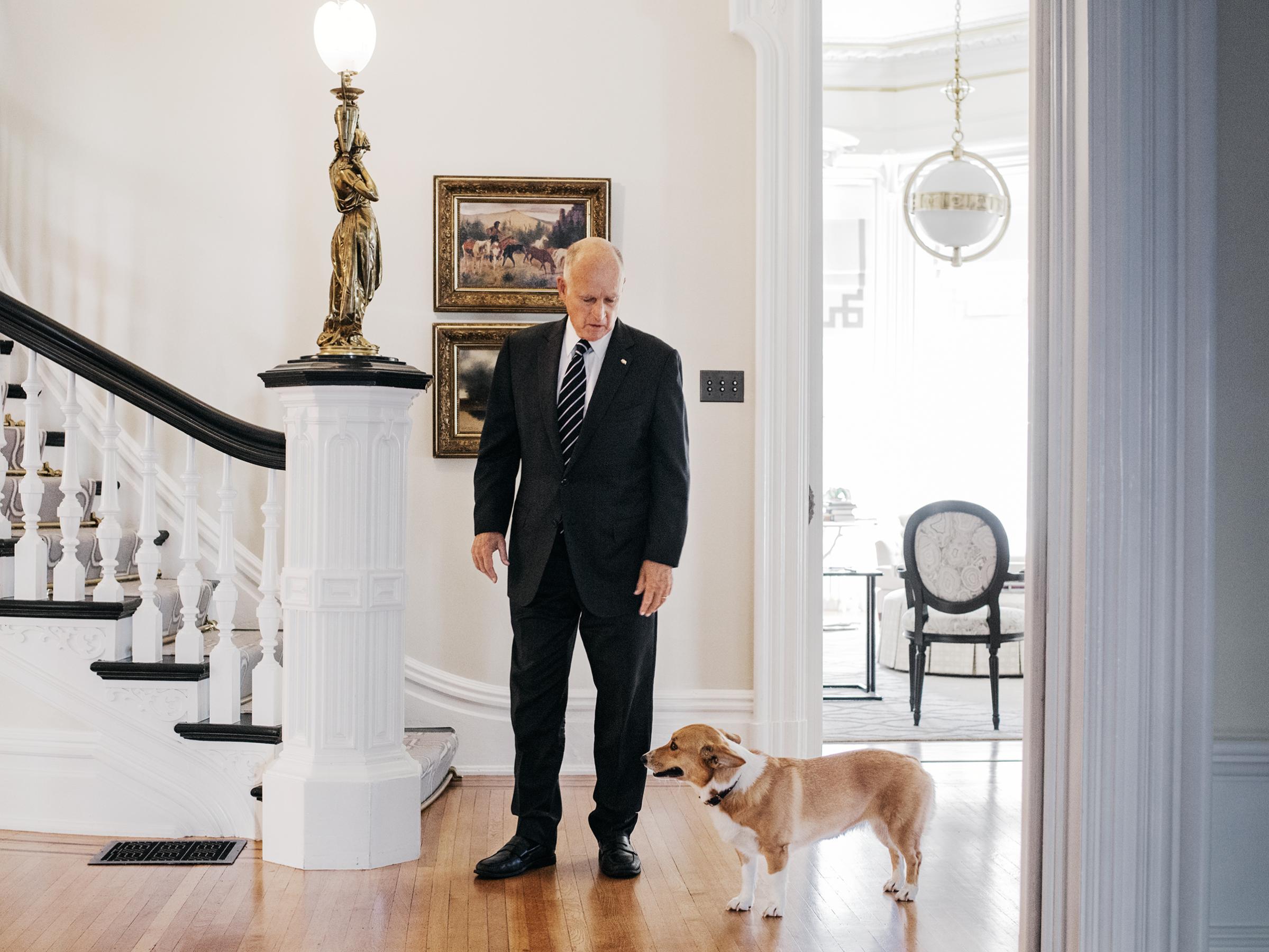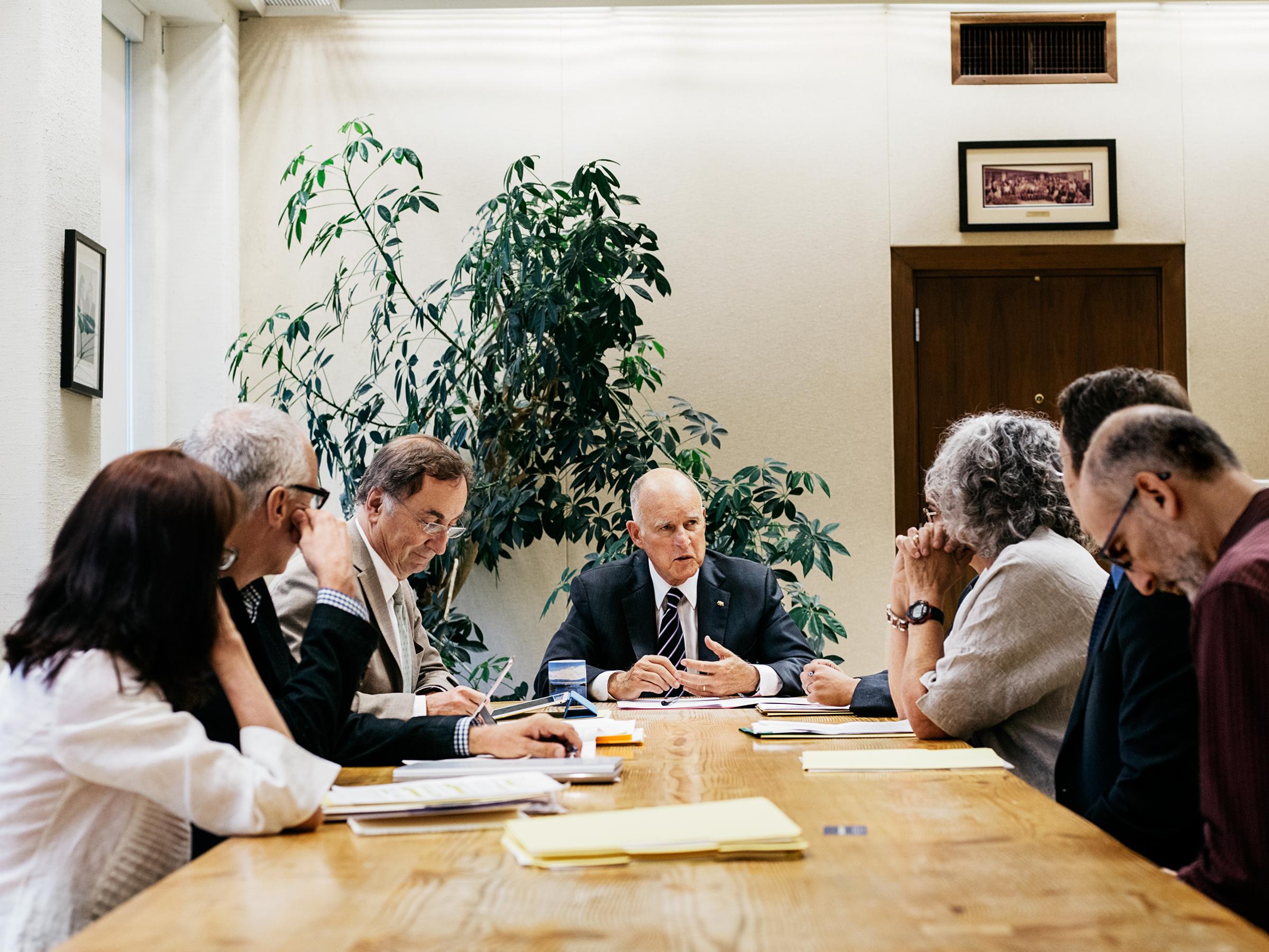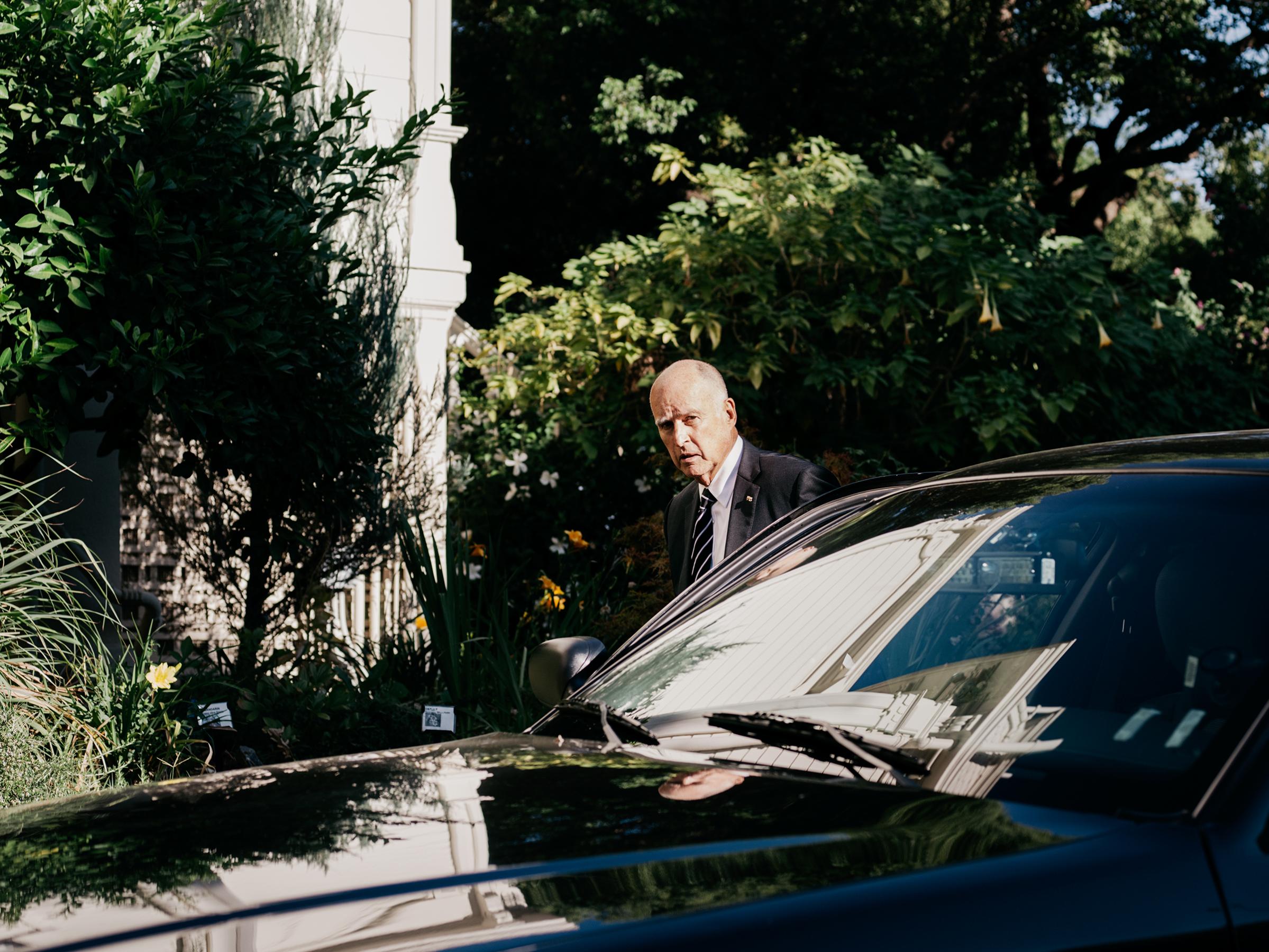
It was one of San Francisco’s famously cool summer days and a victorious moment for the 79-year-old governor, one that would not have had the same electricity if Hillary Clinton had been the person occupying the Oval Office.
“There are turning points where the earth goes into irreversible change,” Brown warned, preparing to sign legislation he had championed to extend California’s singular cap-and-trade program until 2030. “This is not about a politician,” he went on. “It’s about the world. And California is leading the world in dealing with the principal existential threat that humanity faces. I mean, what could be a more glorious undertaking than the one we’re now embarked upon?”
California has always been a place for glorious undertakings — mining for gold, chasing fame, coming up with Silicon Valley’s next big idea — and few names carry more political weight in the state than Brown’s. Following in his father’s footsteps, Jerry Brown first served as governor 40 years ago, and as he nears the end of an unprecedented fourth term, the election of Donald Trump has arguably made the Golden State’s chief executive the most powerful Democrat in America. As Washington continues to be dominated by scandal and squabble, the state that likes to think of itself as an engine for progress is using the President as fuel. “We are getting sh-t done,” Brown said to a cheering crowd of union members in late August in San Francisco, touting recent achievements like passing a gas tax that will fund $52 billion in road repairs. “We’re here to lead,” Brown said, “not to listen to that clown in Washington tear the country apart.”
Over the past half century, Brown has served not just as governor but as California’s secretary of state and attorney general, the mayor of Oakland and the head of the state’s Democratic Party. The idealist once derided as “Governor Moonbeam” also lost elections, including three bids for the White House and one for the Senate, failures that propelled a wilderness period during which he studied meditation in Japan, aided Mother Teresa in India and practiced his Spanish in Mexico. Along the way, people asked the question: Why didn’t he just give politics up?
One answer is that he really likes being a politician, including the part where you run for office and the part where you solve big problems. When Brown returned to the state’s highest office in 2011, erasing any doubts that he was washed up, he faced economic tumult and a prevailing opinion that the enormous, complicated state was simply ungovernable. Although he led the state out of that financial mess and the California brand has regained its sunny promise over the past six years, the state still faces enormous challenges: inequality, housing shortages, the specter of returning deficits. But the slim, bald man — still full of vim — is keen to take them on, leveraging the fact that Democrats now dominate the once purple state at almost every level. “He’s a man on fire,” says California attorney general Xavier Becerra.
With a to-do list too long to ever complete, Brown is racing a ticking clock. “I was in a hurry when I was 40, and I am now in a hurry when I am 79,” he tells TIME. “I do think there is a greater sense of urgency right now, urgency on my part.” He has limited time to take advantage of his foil in D.C. And as the race to replace him in Sacramento heats up, Brown will also confront a ghost that comes for every politician nearing the end of a long turn in the spotlight. “Eventually, he will face the issue of all lame-duck chief executives,” says Ethan Rarick, associate director of the Institute of Governmental Studies at University of California, Berkeley. “For the first time in a long time, the focus of the state will not be on Jerry Brown.”

Outside Brown’s office at the capitol in Sacramento stands a bronze statue of the grizzly that appears on the state flag. Inside, wearing a pin of that same California bear on his lapel, Brown points to a black-and-white photograph taken when he was studying to become a Jesuit priest as a young man. “It was withdrawal, it was speaking in Latin, it was silence,” Brown says of those three and a half years, “a totally different world.” Standing in identical robes with the other novitiates who were being taught the values of obedience, poverty and chastity, young Jerry is hard to pick out. And so it seems little surprise that he left: a life of blending and being guided by someone else’s ideas was not a natural path for a boy who grew up being enamored with, and repelled by, the machinations of politics.
His father, Edmund “Pat” Brown Sr., was “a glad-hander in the best sense of the word,” says Rarick. “He worked every room he ever walked into.” Pat Brown, who was governor in the late 1950s and ’60s (before a political novice named Ronald Reagan tossed him out), was famous for building and expanding, whether it was ambitious water projects or new campuses in the state university system. His son is now pursuing some grand and controversial visions in that vein, like building a high-speed rail system that would stitch San Francisco to Los Angeles through the state’s rich agricultural corridor and constructing massive tunnels to bring water from the river delta in the north to cities and orchards farther south. But the socially liberal and fiscally conservative Brown, who famously ditched the governor’s limousine for a blue Plymouth the first time he was elected, is better known for preaching about limits–whether it’s curbing the influence of lobbyists or telling people that the fossil-fuel party can’t go on forever.
Brown has been a moderating force for the more liberal lawmakers in Sacramento. In August, for instance, he said there would have to be changes to a so-called sanctuary-state bill that would limit the amount that local law enforcement can aid federal immigration authorities, upsetting immigrant-rights advocates. He would likely protest the comparison, but his career owes more to Bill Clinton’s politics of the center than Barack Obama’s more muscular liberalism. In any case, the exact location of Brown’s philosophy on the spectrum from left to right matters less than the fact that Democrats hold every important office here, and so getting things done is easier than it is in Washington. Meanwhile, California’s vast impact on the global economy means that the veteran pol cannot avoid— and clearly enjoys— his outsize role on the global stage. Shortly after Trump withdrew from the Paris climate accord, Brown traveled to China to discuss global warming with President Xi Jinping. He also announced that San Francisco will host a Global Climate Action Summit next year. And on Sept. 3, he flew to Russia to attend an economic forum, with plans to call for greater “trans-Pacific collaboration” on the issue.
At Brown’s Sacramento office, bookshelves sag under the weight of volumes covering an array of topics a hundred miles wide: money, food, sports, Islam, ethnobotany. Ask him what he’s reading now and he eventually lists three books (on Christian philosophy, preserving habitats and social democracy in Germany from 1905 to 1917). On the windowsills are models of high-speed trains. On the wall is a Chinese tapestry and a photograph of his father with JFK. Above one doorway is a picture of his staff from the era when he was first elected governor in 1974, at age 36; above another is the crew that served with him after he returned at 72. Brown says he’s been better at the job this time around. “Whether it is studying algebra or riding a bicycle, the more practice you have, the better you get,” he explains.
When Brown ran for President in 1980, during his first stint as governor, his slogan was “Protect the Earth — Serve the People — Explore the Universe.” The Moonbeam nickname, bestowed upon him by a columnist, seemed to fit the leader of hippie-dippie California voters, a man who was already sounding the alarm about the need for solar energy and making suggestions that California should launch its own communications satellite (an idea that may have seemed crazy at the time but turned out to be prescient).
Jerry 2.0 is more grounded, having spent time filling potholes and wooing developers as the mayor of Oakland. He made waves the first time he led the state by refusing to live in a new governor’s mansion that the Reagans had built — instead forking out $250 a month for a minimally furnished apartment. This time, he’s living in the old, refurbished mansion that his father once inhabited. At one point, the place was a dank museum, with his mother’s old dresses hanging in the closet long after she had gone. New generations of the extended Brown family and delegations from places like China have brought the place back to life. Still, he adds, “it has the odors and the memories and the echoes of the people who went before. So it does ground what I am doing now.”

And then there is the Trump factor. Brown got what you might call a “Trump bump” this year, hitting record approval ratings during the President’s first 100 days in office. Despite taking jabs at Trump in recent speeches, Brown says he does not like to use the word resistance. “I’d like to reframe it as action. And we started taking action in California long before Donald Trump was even heard of,” Brown says, sitting in a wooden chair at his office. “There are things he is doing and saying that I don’t agree with or don’t like, but we are on our own positive program.” California will simply continue down its green, immigrant-friendly path, he says, “and to the extent that the Trump Administration tries to throw up roadblocks, we will try to combat that and take action against it where we can.”
There is no question that California has been showcasing forms of resistance. The state and various cities in it have sued Trump over everything from health care to energy-efficiency standards to the President’s promises to deny federal funds to sanctuary cities. Places like San Francisco and Berkeley have proposed divesting from any firms that help build a border wall. There are fights brewing over pesticides used on California farms and potential crackdowns on legal marijuana. Leading tech CEOs from Silicon Valley have abandoned presidential advisory councils in protest over Trump’s stances on immigration and his handling of white nationalists’ protests. One state lawmaker even suggested altering textbooks in California to include information on Russian meddling in the 2016 election.
There is also little doubt that Brown’s actions, at least on climate change, are adding to the resistance momentum. At a State Department press conference around the time of Brown’s trip to China, a reporter asked about his meeting with another country’s head of state, characterizing it as an effort “to kind of go around the Trump Administration’s stance on the Paris Agreement.” The spokesperson responded, “Well, Jerry Brown is not a part of the Trump Administration.” The reporter responded,”That’s exactly what I’m saying.”
When asked what he most wants to achieve during the 16 months he has left in office, Brown answers in paragraphs, mentioning the budget, the environment, prison reform, housing and schools as well as his big, expensive infrastructure projects. “And there are probably many more things that would come to mind,” he says, “if you asked me specifically about them.” He fondly calls California a “place of ideas and ferment.”
When asked what the election of Donald Trump teaches us about America, Brown’s first response is that “it teaches us that a lot of people did not like Hillary Clinton,” a person he had rocky relations with after running against Bill Clinton for the presidential nomination in 1992. He qualifies that by saying that the GOP “did a very effective job” of undermining her and that the result more broadly reflects “a deep disorder in contemporary politics,” because Trump was successful despite having a casual relationship with the truth, despite his vacillating and tweeting. “There is a superficial, unreal quality about a lot of the debate and discussion going on in the public life of America,” he says, adding that there is “great peril if we, the leaders, don’t take things with more sincerity and more depth.”
But while Brown looks at American politics and sees people who aren’t thinking through the endgame, he clearly loves the process and the clunky, cluttered, imperfect game it creates. “This political world is a combat,” he says. “It’s quite a collision of very different ideas, and that is part of how we resolve disputes. It’s messy, in many ways it’s dismaying, but it is the democratic process.” Brown can’t put into words one thing that has driven him to run all these years, other than the fact that it suits him. “People in politics like to be in politics. They like to talk, they like to be seen, they like to hang out with people who can give them money,” he says, “and then hopefully, they like, just as much and more, to do what they are elected to do.”
Which all leads back to that question: Will he ever quit? Bernie Sanders just made a run at the presidency at age 74. Trump became the oldest President to take the oath of office in January, at age 70. Some who know Brown well, like former San Francisco mayor Willie Brown, believe that age won’t slow him. He has urged Brown to take a spin in his old job at city hall. “If you can perform and you can still think, then you should be rewarded,” he says, “because your value is so much greater than somebody who is still trying to find the bathroom.” But the governor says he will not run for mayor of San Francisco. And while he’s certainly not tired of people asking whether he will run for President in 2020, the answer is a pretty hard “no.”
That is, however, the same answer he gives when you ask Brown if he thinks about his legacy. “If you actually think about it, what would that mean? Are you talking about a book someone would write about you?” he says, starting one of his Socratic dialogues, pressing for an answer to push back against. “It is kind of a morbid, backward-looking thought,” he says, “whereas if you are fully alive and every day you are getting up and the sun is shining and the birds are chirping … I mean, there is stuff to do, problems and crises. That is very exciting.” Doesn’t it make more sense, he asks, that a politician would arise to tackle the day than try to shape some nebulous future impression of what he had achieved? “The concept is thin,” he says, “to be charitable.”
If Brown still is a man on fire, friends and colleagues say it’s partly due to Anne Gust Brown, a seasoned lawyer and close adviser whom Jerry, a bachelor for decades, married at age 67. They describe her as not only a source of oxygen for the flames but a ventilation system that keeps the burn steady and controlled. “He’s like a wave of energy that just moves,” says longtime friend Bill Biamonte, and she keeps him focused. “If he had met Anne earlier,” Biamonte says, “I really believe he would have been President.” Although baby boomers might remember Brown’s fling with rocker Linda Ronstadt during his first stint in office, the governor says he’s better suited to being off the market. “We work together very carefully and closely and we enjoy our company immensely,” he says of his wife. “I would have never imagined it was this good, and I am sorry I didn’t get married earlier.”
During TIME’s interview with the governor, Gust Brown was comparing batteries that the couple might use on their solar microgrid at a ranch they’re constructing in Colusa County, northwest of Sacramento. The spot is Brown family land: a blanched animal skull from the area sits on a table in his office, below a photograph of his great-grandfather herding sheep there. His dog, named Colusa (three parts corgi, one part border collie), scampers around the room. Brown speaks tenderly of the land where his family once had a mountain house, a place his grandmother would tell him about while reading stories from the Bible. “They inhabited it the first time, and now going back a second time, we’ll re-inhabit it and transform it with olive trees and a home,” he says. “It will be a place where I can invite people and do things and learn how to live in 110-degree heat, because that is the way my great-grandfather lived.”
The picture is romantic and detailed, but other people have trouble seeing it. “I have never envisioned Jerry Brown as being a farmer,” says Willie Brown, who worked with him in Sacramento during Brown’s earliest days in statewide office. “I assume he’s building a vacation home for a President.”
Correction: The original version of this story incorrectly identified Ethan Rarick as a politics professor. He is the associate director at the Institute of Governmental Studies.
More Must-Reads from TIME
- Cybersecurity Experts Are Sounding the Alarm on DOGE
- Meet the 2025 Women of the Year
- The Harsh Truth About Disability Inclusion
- Why Do More Young Adults Have Cancer?
- Colman Domingo Leads With Radical Love
- How to Get Better at Doing Things Alone
- Michelle Zauner Stares Down the Darkness
Contact us at letters@time.com